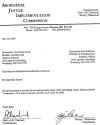| Reports Aboriginal Justice Implementation Commission |
||||
|
Report of the Aboriginal Justice Inquiry of Manitoba
|
ABORIGINAL JUSTICE IMPLEMENTATION COMMISSION SECOND QUARTERLY REPORT JUNE 30, 2000
Summary This Report covers the period April 1, 2000 to June 30, 2000. In that period the Commission,
TABLE OF CONTENTS Background
The Aboriginal Justice Implementation Commission was established by the Manitoba Government on November 29, 1999, to be: "responsible for recommending priority areas for government action with respect to those areas for which the Manitoba Government is accountable and responsible; recommending practical, cost-effective and attainable implementation and funding strategies for the activities for priority action within existing Canadian law; reporting on the current status of implementation of the recommendations of the Aboriginal Justice Inquiry; and communicating and consulting with Manitobans in relation to the setting of priorities and development of implementation strategies". (O/C 459, 1999) The Commissioners are Wendy Whitecloud and Paul Chartrand. Elders are Eva McKay and Doris Young. The tasks of the Commission are:
In carrying out its work, the Commission is required to keep in mind the Framework Agreement, entered into between Canada and First Nations and the Reports of the Royal Commission on Aboriginal Peoples. Further information on the Commission, including its terms of reference and first quarterly report can be found at the Commission’s website at www.ajic.mb.ca. 2. Activities TOP The Commission continued to work in the priority areas it had established through consultation with Manitobans. Those priority areas are: Child Welfare Continuing Consultations: During the last quarter the Commission or Commission staff met with the following organizations or persons: The Minister of Labour and Minister responsible for Multiculturalism, Honourable Becky
Barrett Expert Advice: The Commission, having set its priorities, wishes to design recommendations that can be implemented in a practical, efficient and cost effective manner. To do this, it is examining experience elsewhere and soliciting opinions from experts. To these ends the Commission has contracted for short research or advisory memoranda in the following areas,
Other Activities: The Commission also facilitated a meeting between representatives of Manitoba Keewatinowi Okimakanak Inc. and the Department of Conservation aimed at assisting the parties with communications and other matters of mutual interest. 3. Observations TOP In 1991 the Aboriginal Justice Inquiry noted that, in 1983 Aboriginal people accounted for 37% of the population of the Headingley Correctional Institution and that by 1989 they had accounted for 41% of the population. A recent one-day snapshot of the population of Headingley Correctional Institute indicated that Aboriginal people made up 60% of the population. The Aboriginal Justice Inquiry also noted that in 1989 Aboriginal people accounted for 67% of the population at the Portage Correctional Centre for Women. The same one-day snapshot indicated that the percentage of Aboriginal women on that day was 82.4% of the resident population. In 1989 the Aboriginal population in institutions for young people was 61%. Recently it was 85% at the Agassiz Youth Centre and 80.3% at the Manitoba Youth Centre. In Manitoba, Aboriginal people represent less than 15% of the population. Thus Aboriginal people have been, and currently are, significantly over represented in the population of penal institutions in Manitoba. Further, this over representation has been increasing. The causes of this over representation are complex and varied but, as it carried on its consultations and reviewed the literature, the Commission has been struck by the consistency of advice that it has received. This advice confirmed its earlier priority setting exercise. Person after person speaking to the Commission has pointed to areas outside the justice system that need addressing, in particular, the effects on the family of poverty, ill health and marginalization. For example in the National Crime Prevention Centre publication, Young People Say, a young person is quoted as follows:
Many people consulted spoke of the importance of a child’s early years. In the Early Years Study: Final Report, Margaret McCain and J. Fraser Mustard note:
The Commission believes that its recommendation in the Child Welfare area that Aboriginal people provide Child Welfare services to Aboriginal families will help to improve the conditions for Aboriginal youth and, in the long run, help reduce the number of Aboriginal youth that come into contact with the Justice system. The Commission also agrees that emphasis on the early years is extremely important and it hopes that the recently announced Healthy Child Initiative of the Manitoba Government will aid in reducing the number of young people, in particular Aboriginal young people, that become involved in the Criminal Justice System. The Commission intends to keep these observations in mind as it proceeds with its work in its priority areas. 4. Next Steps TOP The Commission will continue its consultations. It will also continue to examine the recommendations of the Aboriginal Justice Inquiry and the Royal Commission on Aboriginal Peoples in its priority areas. It will review the advice it has currently contracted for and will seek further advice in other priority areas. The Commission also expects to consult with senior government officials to ensure its recommendations are appropriately designed. It may do this through individual consultations or, where appropriate, through the use of round tables. The Commission will make further recommendations over the fall and winter. |
|||
 Manitoba Government Home Page Manitoba Government Home Page |
